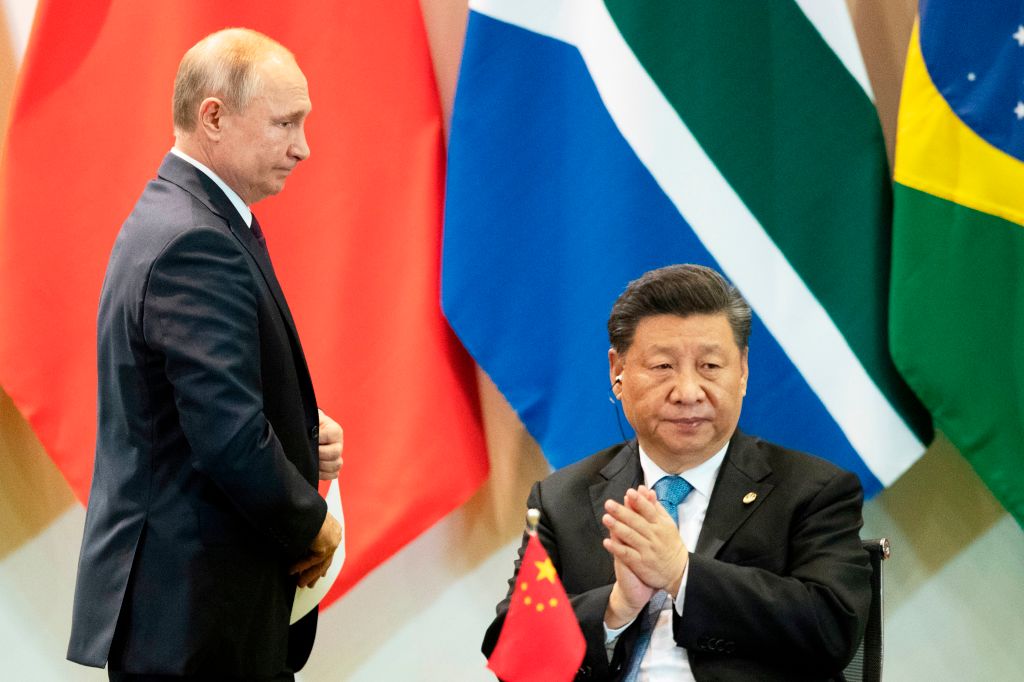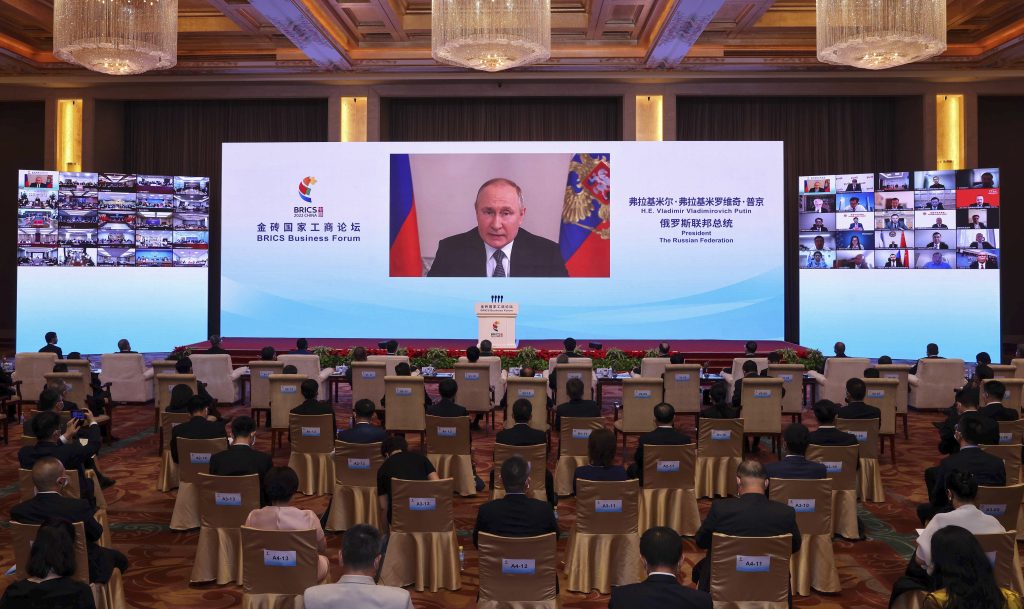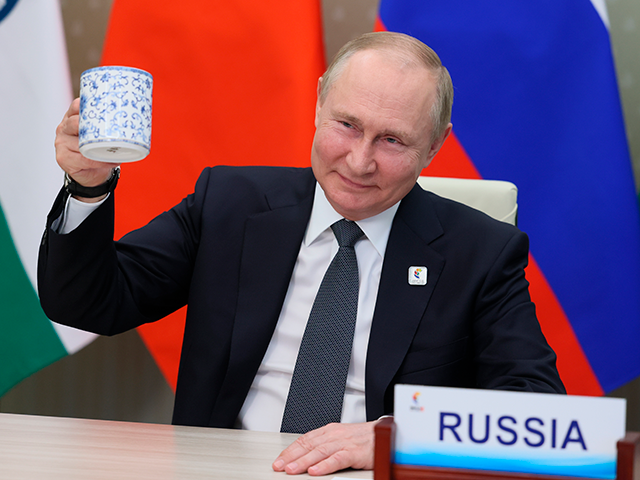Despite his international pariah status after invading Ukraine, Russian leader Vladimir Putin was a welcome guest at the 14th summit meeting of the BRICS forum Thursday.
Putin used his appearance to push his agenda for reducing the importance of the American dollar for international trade — an important step toward liberating brutal tyrannies such as Russia and China from international human rights standards.

China’s leader Xi Jinping (R) and Russia’s leader Vladimir Putin attend a meeting with members of the Business Council and management of the New Development Bank during the BRICS Summit in Brasilia, November 14, 2019. (PAVEL GOLOVKIN/POOL/AFP via Getty Images)
Russia is the “R” in BRICS; the other four members are Brazil, Indian, China, and South Africa. Russia’s state-run Tass news service reported that BRICS is looking to substantially expand its membership roster, which would give Moscow and Beijing a much larger cudgel to beat the dollar with:
The group’s expansion is expected to be one of the main topics on the agenda. In May, China suggested launching discussions of the issue and Russian Foreign Minister Sergey Lavrov said that Argentina and Saudi Arabia had expressed interest in joining BRICS. According to experts, other potential candidates include Bangladesh, Egypt, the United Arab Emirates and Uruguay who joined the BRICS New Development Bank last year. In addition, analysts point out that events held on the sidelines of the BRICS foreign ministers meeting involved representatives of Indonesia, Kazakhstan, Nigerian and Thailand.
Ways to reduce the role of the US dollar in financial transactions between member states will be another focus of attention. The Russian president stated earlier that together with other BRICS nations, Moscow was working on alternative mechanisms of payment. Putin emphasized that Russia’s financial messaging system was open for banks from other BRICS countries to join. According to Putin, efforts are underway to create an international reserve currency based on the basket of BRICS currencies and Russia’s Mir payment system is expanding its global presence.

In this photo released by Xinhua News Agency, Russian President Vladimir Putin delivers a keynote speech in virtual format at the opening ceremony of the BRICS Business Forum in Beijing Wednesday, June 22, 2022. (Yin Gang/Xinhua via AP)
During Thursday’s virtual summit, Putin boasted that Russia’s trade with the other members grew 38 percent during the first quarter of 2022, which includes the beginning of the Ukraine invasion. He touted a plan to create a new international currency backed up by a “basket” of reserves from the BRICS treasuries.
China floated a proposal for a free-trade deal among BRICS members, which would provide a major boost to this proposed new currency, and could also begin prying India away from the U.S.-led Quadrilateral Security Dialogue, commonly known as the “Quad.”
Neither Putin’s plan for a new currency, nor China’s free trade idea, appeared on the public agenda for the BRICS summit that was released Wednesday.
Some outside analysts were skeptical of these grandiose proposals, noting that most of the BRICS countries and their associate members have too much invested in the dollar to endorse a manufactured replacement currency.
“The BRICS may seem irrelevant because it hasn’t really moved the needle forward on its long-standing efforts to usher in viable global economic alternatives to the U.S.-led existing system,” Wilson Center deputy director Michael Kugelman told the BBC on Thursday.
The BBC wondered if this time might be different, because Russia is pushing very hard to weaken the impact of American and European sanctions, while inflation, supply chain disruptions, and food shortages caused by Russia’s war and the sanctions against it are causing great anxiety among developing nations.
“I expect the summit to underscore the group’s global importance because of its collective demographic and economic clout. I also expect it to help poorer and middle-income countries build resilience to deal with the economic impacts of the Ukraine crisis,” Kugelman predicted.
Rand Corp. analyst Derek Grossman told Foreign Policy on Thursday that “I” might be the most interesting letter in the BRICS acronym, because India is walking a tightrope between East and West – remaining neutral on Ukraine to keep its profitable commerce with Russia alive, while keeping a watchful eye on China and cultivating its strategic relationship with the United States.
“India lives in a rough neighborhood and has been able to stick by its nonaligned policy to ensure its strategic autonomy by essentially engaging with everybody, and they’ve done a pretty good job of that,” Grossman said.
“But as great-power competition continues to heat up, not just between the U.S. and China but now the U.S. and Russia, it’s going to be increasingly difficult and delicate to maintain that balance,” he predicted.
From this perspective, India has a certain veto power over Russian and Chinese ambitions for BRICS, and Prime Minister Narendra Modi is canny enough to know how valuable that makes India to the Western world. Putin’s war on the dollar cannot begin in earnest unless India enlists.

COMMENTS
Please let us know if you're having issues with commenting.